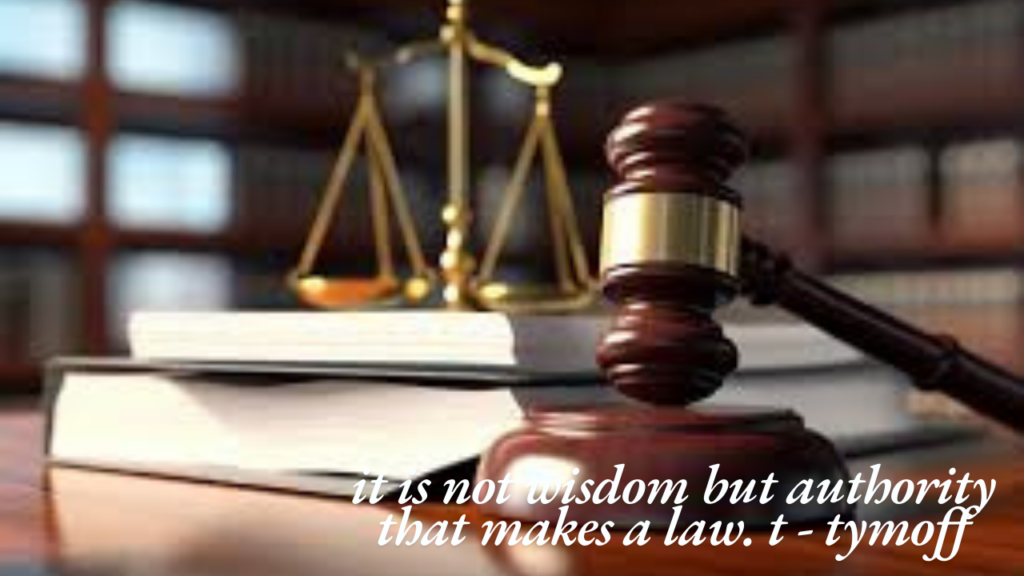In the realm of law and governance, the phrase “it is not wisdom but authority that makes a law. t – tymoff” resonates deeply. This statement prompts a profound examination of the nature of law, the role of authority, and the philosophical underpinnings of legal systems. As we navigate through history and contemporary society, we encounter numerous instances where authority supersedes wisdom in the creation and enforcement of laws. This article will explore the implications of Tymoff’s assertion, examining how authority shapes legal frameworks and the potential consequences for justice and morality.
The Essence of Authority in Law
The statement “it is not wisdom but authority that makes a law. t – tymoff” suggests that the legitimacy of law is derived primarily from the authority that enacts it, rather than the wisdom behind it. In many societies, laws are created by governing bodies, such as legislatures, which derive their authority from various sources—be it democratic processes, monarchies, or even authoritarian regimes.
When laws are established, they often reflect the will of those in power rather than a collective moral understanding. For instance, a law passed by a government might prioritize political agendas or economic interests rather than the common good. This reliance on authority raises critical questions about the integrity of legal systems and their ability to serve justice.
Historical Context
Throughout history, we see examples where authority has dictated the nature of laws, often with dire consequences. The Nuremberg Laws in Nazi Germany serve as a stark reminder of how authority can craft legal frameworks that are deeply unjust. Despite being laws, they were rooted in an ideology that discriminated against entire populations, showcasing that authority alone does not equate to wisdom or justice.
Similarly, in various totalitarian regimes, laws are often used as tools of oppression, serving the interests of those in power while disregarding fundamental human rights. The assertion “it is not wisdom but authority that makes a law. t – tymoff” underlines the risk of allowing authority to prevail over wisdom in legal matters, emphasizing the need for checks and balances to prevent abuse.
The Role of Philosophy in Law
Philosophers throughout history have grappled with the relationship between authority and wisdom. Thinkers like Plato emphasized the need for philosopher-kings, leaders who would govern based on wisdom rather than mere power. In contrast, Tymoff’s perspective suggests a more pragmatic, if somewhat cynical, view: that the mere existence of authority is sufficient for law-making.
This raises an important point about the intersection of ethics and law. If laws are merely products of authority, what happens to the moral responsibility of lawmakers? Is there an obligation to ensure that laws reflect ethical considerations, or is it enough to enforce what is decreed by those in power?
Contemporary Implications
In modern democracies, the balance between authority and wisdom continues to be a contentious issue. Legislators are often faced with the challenge of enacting laws that reflect the will of the people while also upholding ethical standards. The phrase “it is not wisdom but authority that makes a law. t – tymoff” serves as a reminder that authority can sometimes overshadow the need for thoughtful deliberation.
Take, for example, the rapid passage of laws in response to crises, such as public health emergencies. While swift action can be necessary, the lack of thorough consideration can lead to poorly crafted laws that may infringe on individual rights or fail to address underlying issues. This highlights the critical importance of ensuring that authority is tempered by wisdom.
The Need for Accountability
To mitigate the potential pitfalls of an authority-driven legal system, it is essential to establish mechanisms of accountability. This could include judicial review, public consultations, and participatory governance, where citizens have a voice in the law-making process. The idea is not to dismiss authority outright but to ensure that it is held accountable to the principles of justice and ethics.
By acknowledging that “it is not wisdom but authority that makes a law. t – tymoff,” we can work towards creating a legal system that prioritizes not only the enforcement of laws but also their moral foundation. This approach fosters a more equitable society where laws serve the greater good.
FAQs
What does the quote “it is not wisdom but authority that makes a law. t – tymoff” mean?
A1: This quote emphasizes that the legitimacy of a law derives from the authority that enacts it rather than the wisdom or ethical considerations behind it.
How does authority influence the creation of laws?
A2: Authority can dictate the content and enforcement of laws, often prioritizing the interests of those in power over moral or ethical considerations.
What are historical examples of authority-driven laws?
A3: Historical examples include the Nuremberg Laws in Nazi Germany and various laws enacted in totalitarian regimes, which often serve to oppress rather than protect citizens.
Why is accountability important in law-making?
A4: Accountability ensures that laws are not only enforced but also ethically sound, preventing abuse of power and protecting individual rights.
How can we ensure that wisdom plays a role in law-making?
A5: Establishing mechanisms such as public consultations, judicial review, and participatory governance can help ensure that laws reflect ethical considerations alongside authority.
Conclusion
The phrase “it is not wisdom but authority that makes a law. t – tymoff” invites us to critically reflect on the nature of law and the role of authority in shaping our societies. While authority is necessary for law-making, it must be balanced with wisdom and ethical considerations to create a just legal system. By acknowledging the potential dangers of an authority-driven approach, we can strive for a legal framework that embodies both the rule of law and the principles of justice. In doing so, we pave the way for a society that not only obeys laws but also respects the deeper moral imperatives that underpin them.
